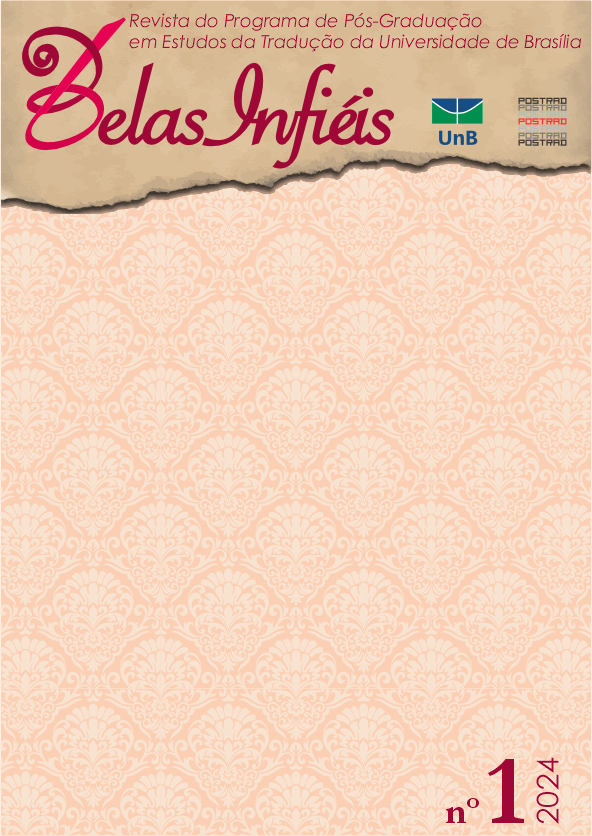Sueños, de Juan-Eduardo Cirlot
DOI:
https://doi.org/10.26512/belasinfieis.v13.n1.2024.53331Palabras clave:
Surrealismo. Dau al Set. Sueños. Juan-Eduardo Cirlot.Resumen
Juan-Eduardo Cirlot es un poeta catalán vinculado a los movimientos de vanguardia de la primera mitad del siglo XX, con una notable aportación al surrealismo español de las décadas de 1930 y 1940, principalmente a través de su participación en el grupo Dau al Set, junto a Joan Brossa, Joan Ponç, Antoni Tàpies, Modest Cuixart y Joan-Josep Tharrats. Entre el hermetismo y la transparencia, y con una alta carga simbólica, la poesía de Cirlot moviliza diversas influencias. Se remonta a tradiciones místicas y, al mismo tiempo, apunta a rupturas experimentales contemporáneas.
Referencias
Benjamin, W. (2013). Rua de mão única / Infância e história: 1900 (J. Barrento, Trad.). Autêntica.
Cirlot, J-E. (1949). Diccionario de los ismos. Argos.
Cirlot, J-E. (1986). Sueños. In L. Cirlot, El Grupo “Dau al Set” (pp. 179–181). Cátedra.
Cirlot, J-E. (1992). Diccionario de símbolos. Labor.
Cirlot, J-E. (1997). Obra poética (Edición de Clara Janés). Cátedra.
Cirlot, L. (1986). El Grupo “Dau al Set”. Cátedra.
Janés, C. (1997). Introduccíon. In Juan-Eduardo Cirlot, Obra poética (Edición de Clara Janés, pp. 13–42). Cátedra.
Lorenzo, A. J. (1993). La poesía de Juan Eduardo Cirlot a la luz del informalismo. Revista de Filología de la Universidad de La Laguna, (12), 191-200.
Mallarmé, S. (2010). Divagações (F. Scheibe, Trad.). EdUFSC.
Descargas
Publicado
Número
Sección
Licencia
Derechos de autor 2024 CC BY

Esta obra está bajo una licencia internacional Creative Commons Atribución 4.0.
Copyright Statement
Given the public access to this journal, the texts are free to use but requires the recognition of the original authorship and initial publication in this journal to be properly stated.
The journal allows the use of works published for non-commercial purposes, including the right to submit the work to publicly accessible databases. Published contributions are the sole and exclusive responsibility of the author(s).
- When submitting papers to be evaluated by the Belas Infiéis journal, the author(s):
- Declare that the contents of the contributions are original and of their original creation, being entirely responsible for their content if there is an objection by third parties.
- Claim to be aware that they should not commit academic plagiarism.
- Declare that the manuscript has not been published, completely or partially, in Portuguese or another language. If it is a translation it should be submitted to the Translated Articles section.
- Declare that the manuscript is not being evaluated by other journals.
- Declare that the manuscript was not submitted to another journal simultaneously.
- Commit(s) to inform the journal of any kind of error or inaccuracy in their contribution (published, in evaluation or in editing) and to collaborate with the editors to make due corrections of the article (when in evaluation or editing) or erratum/retraction (after publication).
- Declare that there is no conflict of interest regarding the published work.
- Authorize its release if it is accepted for publication without any kind of monetary compensation.
- Agree to assign non-exclusive rights to publication to the magazine, remaining free to make their contribution available in other media as long as the publication of the first version in Belas Infiéis magazine is mentioned. They also authorize Belas Infiéis to assign their texts for reproduction in content indexers, virtual libraries and similar platforms.
- Maintain copyright and grant the journal the right of first publication, the work being licensed under theCreative Commons Attribution License.
- Is/Are allowed and encouraged to publish and distribute their work online after the editorial process, which may increase the impact and citation of the published work.
- Authorize the editorial team to make textual adjustments and to adapt the article to the publication rules, when necessary.



















